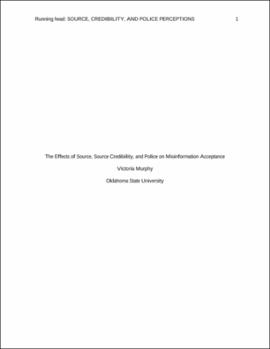| dc.contributor.author | Murphy, Victoria | |
| dc.date.accessioned | 2021-05-25T19:35:56Z | |
| dc.date.available | 2021-05-25T19:35:56Z | |
| dc.date.issued | 2021-04-22 | |
| dc.identifier | oksd_murphy_HT_2021 | |
| dc.identifier.uri | https://hdl.handle.net/11244/329869 | |
| dc.description.abstract | There are multiple sources from which misinformation may be presented to an eyewitness following an event. Previous studies have shown that the perception of the individual conveying misinformation can impact the likelihood that another individual will accept that false information. We examine how perceptions of source (police officer, neighbor) as well as their perceived trustworthiness (high, low) may impact the acceptance of misinformation. 125 participants watched a video of a crime and then read a report written about the crime containing misinformation (control, contradictory, additive). Each participant then completed a survey measuring the amount of misinformation accepted or rejected. Our results showed that participants were most accurate when answering questions containing control misinformation as opposed to contradictory or additive misinformation. | |
| dc.format | application/pdf | |
| dc.language | en_US | |
| dc.rights | Copyright is held by the author who has granted the Oklahoma State University Library the non-exclusive right to share this material in its institutional repository. Contact Digital Library Services at lib-dls@okstate.edu or 405-744-9161 for the permission policy on the use, reproduction or distribution of this material. | |
| dc.title | Effects of source, source credibility, and police on misinformation acceptance | |
| osu.filename | oksd_murphy_HT_2021.pdf | |
| osu.accesstype | Open Access | |
| dc.type.genre | Honors Thesis | |
| dc.type.material | Text | |
| dc.contributor.director | Moore, Kara | |
| dc.contributor.facultyreader | Grice, James | |
| thesis.degree.discipline | Psychology | |
| thesis.degree.grantor | Oklahoma State University | |
